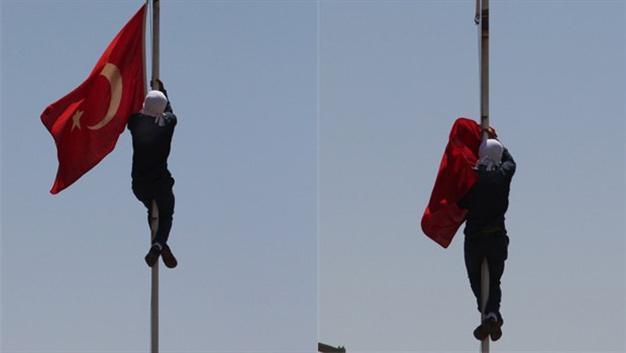'He will pay the price': Turkish authorities condemn flag removal in Diyarbakır
DİYARBAKIR

A masked demonstrator was photographed by Agence France-Presse photo reporter İlyas Akengin, as he was taking down a Turkish flag at an Air Force base in Diyarbakır on June 8. AFP Photo
The Turkish General Staff, President Abdullah Gül and Prime Minister Recep Tayyip Erdoğan condemned the taking down of a Turkish flag at an Air Force base in the southeastern province of Diyarbakır during protests June 8, following the funeral of a man killed during clashes in nearby Lice.President Gül called on all people “to act responsibly and avoid provocative, actions and expressions,” while the army issued a very harsh statement regarding the incident.
“We strongly condemn the attack on the Turkish flag, the symbol of the Turkish nation and our independence for which our martyrs’ blood was shed, by a person who possesses no value. We also want to inform the public that we will pursue the prosecution of finding and punishing this person,” said the General Staff in a statement June 9.
A masked demonstrator was photographed by Agence France-Presse photo reporter İlyas Akengin June 8 as he climbed the flagpole after jumping over the walls surrounding the 2nd Air Force Command.
“A masked person among the demonstrators, some of them children, jumped in from the main entrance of the base and climbed the flag pole in the vehicle control zone between two wire fences. A team [of soldiers] was sent to the area and fired two warning shots in the air. But the person took our flag from the pole,” said the military.
The statement defiantly stressed that the military put every effort to “remain calm” in the face of “provocative actions in which children and women are used with the aim to cause civilian deaths that would trigger massive demonstrations.”
Guilty will 'pay the price': Erdoğan
For his part, Erdoğan vowed that everyone involved in the incident, including the demonstrator and the officials who let him remove the flag, will "pay a heavy price."
"The Interior Ministry has launched an investigation into the issue. The fact that [the demonstrator] is a child does not concern us. He will pay the price the same way as those who sent him there. We will not remain silent just because the person who has attacked our sacred [symbol] in such way is a child," Erdoğan said during a joint press conference with Iranian President Hassan Rouhani in Ankara.
Erdoğan also slammed the military officials who did not intervene during the incident. "He climbs the mast, then pulls the flag. All the soldiers and commanders tasked there will pay the price for it," he said.
The prime minister also slammed what he called provocations attempt against "the non-resolution process," describing road blocks an act of "thugs and terrorists."
Bülent Arınç, PM Erdoğan's deputy, said the government was following the events "patiently." "If there was no patience [in the army], if there was no loyalty to the political will of the government, the person who dared to take down the flag could have been instantly punished," Arınç said.
Parliament Speaker Cemil Çiçek also condemned the incident, while main opposition Republican People’s Party (CHP) leader Kemal Kılıçdaroğlu urged Prime Minister Recep Tayyip Erdoğan to give an explanation concerning the removal of the flag.
“We can never accept such an action,” Kılıçdaroğlu told reporters on June 9 concerning the incident. “We cannot tolerate the removal of flag and we have sent our friends there [Lice] because the government is not providing accurate information,” he added, while accusing Erdoğan of using the peace process as a tool for his personal career and potential ambitions for presidency.
“I’ve been waiting for Erdoğan to come up and speak about this matter. Though he has trampled on all kinds of nationalism, I wonder what he will say about the flag issue,” Kılıçdaroğlu said.
Meanwhile, the “Ülkü Ocakları” (Idealist Hearths), a youth organization with links to the opposition Nationalist Movement Party (MHP), called for nationwide "Respect the Flag" rallies to be held late June 9. Hundreds of people rallied in the Mecidiyeköy neighborhood of Istanbul to march to Taksim Square, carrying flags. The police stopped the march in the Şişli neighborhood.
Clashes had erupted between police and demonstrators after the funeral of Ramazan Baran in Diyarbakır’s suburban Bağlar district. Baran, 26, and Baki Akdemir, 50, both died from gunshot wounds during the security forces’ attack on a roadblock protest against the construction of a gendarmerie post in Lice.
HDP disapproves the attack, as its delegation visits İmralı
People’s Democracy Party (HDP) co-chair Sabahat Tuncel said that her party "disapproves such actions." Stressing that "disrespecting a nation's symbols is something nobody can accept," Tuncel emphasized that the attacker was apparently a child.
"We cannot approve a lynch campaign based on this incident. In the end, we're passing through a sensitive time," she added, warning that "a child's act" shouldn't be attributed to all Kurds.
Meanwhile, a delegation of the the HDP headed to İmralı island yesterday in a surprise visit to outlawed Kurdistan Workers’ Party (PKK) leader Abdullah Öcalan, soon after the clashes in southeastern Turkey.
The HDP’s two deputy group chairs, İdris Baluken and Pervin Buldan, and HDP Istanbul deputy Sırrı Süreyya Önder headed yesterday to İmralı to visit Öcalan. The PKK, however, said yesterday that “sending three-person delegations to meet with Öcalan was not enough for a solution to the problem anymore,” according to the Fırat News Agency, known for its links to the PKK.
“If everyone agrees [that Öcalan is key to the Kurdish solution process], then the walls on peace has to be removed and Abdullah Öcalan should be provided with free working security and health conditions,” said the PKK statement.
The statement came at a time when the violence in Lice has sparked renewed protests across Turkey, mostly in hotspots and sensitive areas, such as Istanbul’s Gazi and Okmeydanı neighborhoods and the southeastern towns of Cizre, Hakkari and Van.
















